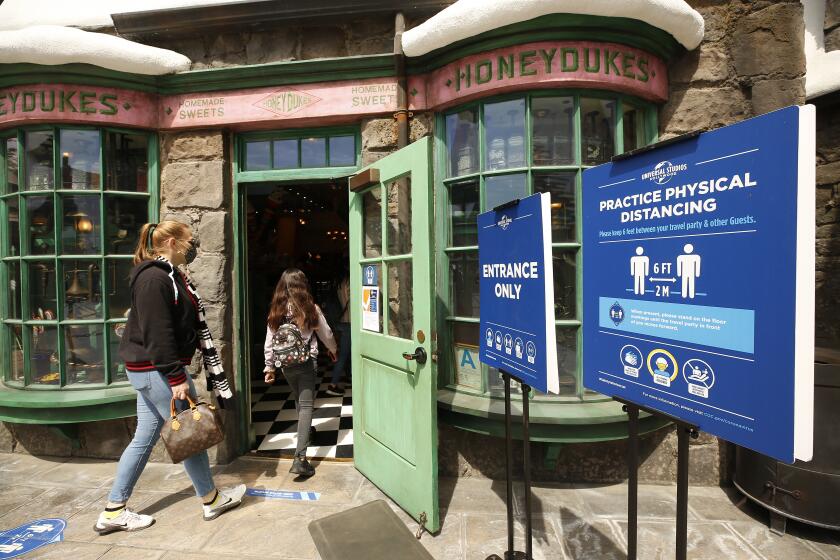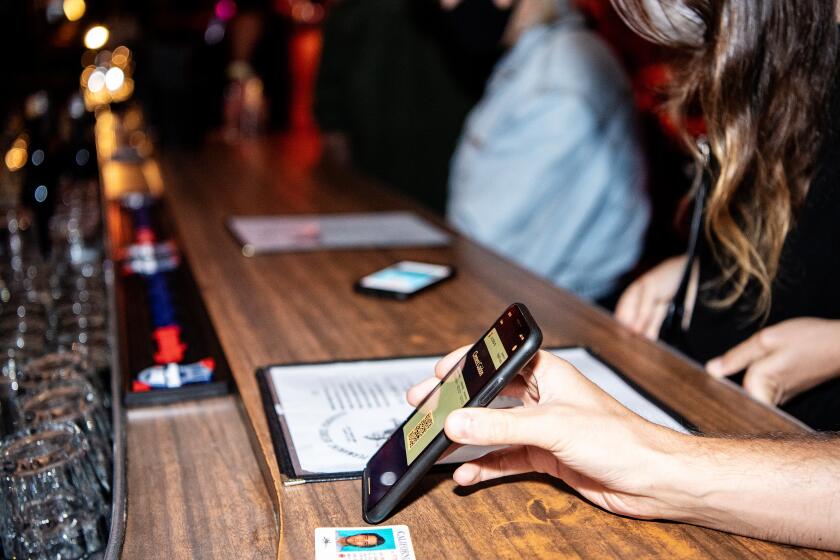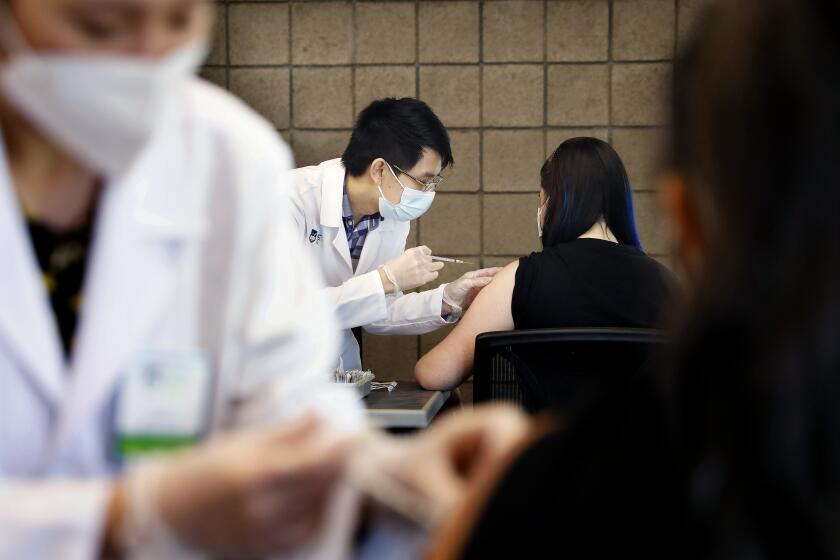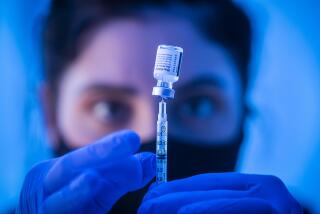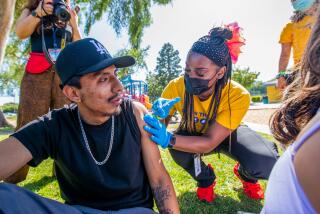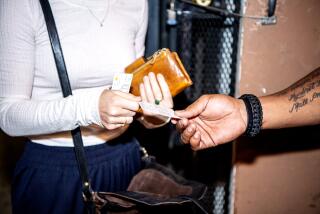COVID vaccinations or negative test to be required at Dodger, SoFi stadium events
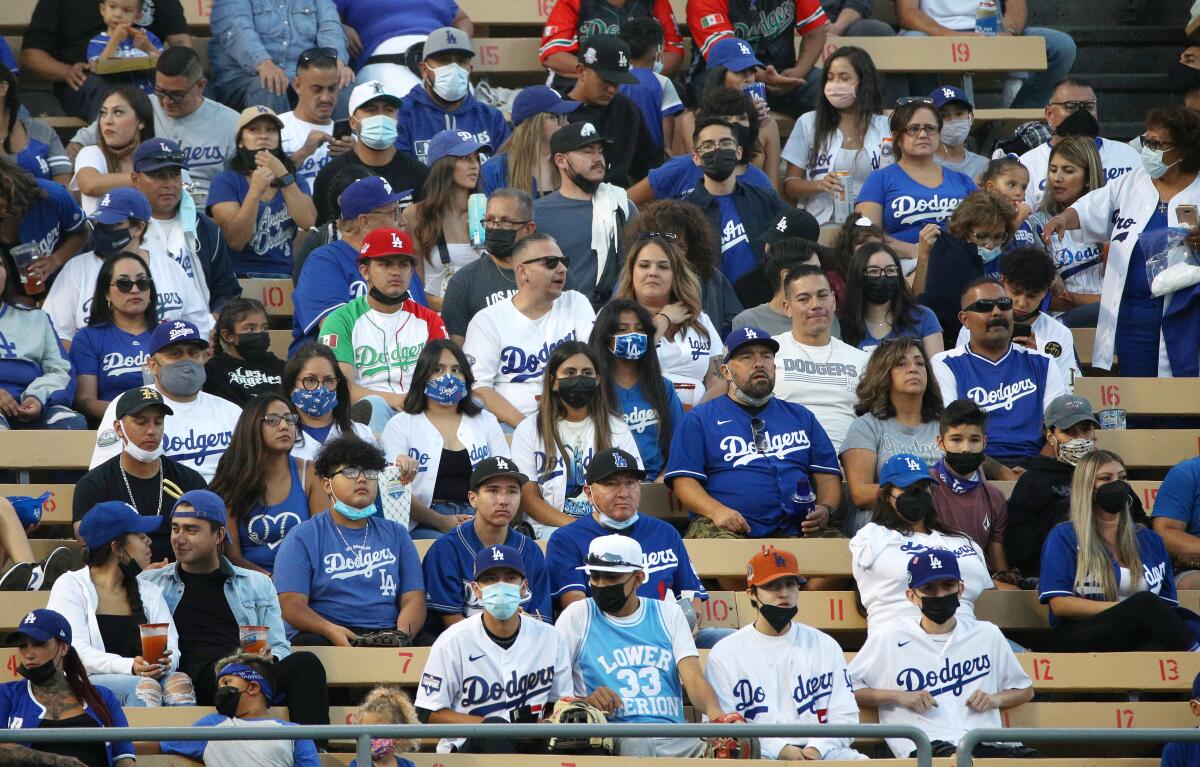
Los Angeles County soon will require proof of COVID-19 vaccination or a recent negative coronavirus test to enter Dodger and SoFi stadiums as well as Major League Soccer venues for events with more than 10,000 people.
L.A. County Public Health Director Barbara Ferrer confirmed Friday that those venues, as well as any outdoor setting where there are more than 10,000 attendees, would be subject to the new, stricter vaccine-or-test requirements that will be imposed beginning next month.
Starting Oct. 7 at 11:59 p.m., guests age 12 and over will need to show either proof of vaccination or a negative result from a diagnostic test taken less than 72 hours before the event.
Ferrer said the vaccine-or-test requirement will apply to venues such as stadiums, arenas and theme parks. It wouldn’t come into play in less-regimented settings where people are constantly coming and going, such as a street fair, Ferrer said.
Both L.A. County and the state already require indoor events with more than 1,000 people — which includes venues such as Staples Center — to ask guests for proof of full vaccination or a recent negative result. Starting Monday, the state no longer will allow those in attendance to simply state they are vaccinated or have recently tested negative; they must instead provide written proof.
The new L.A. County health order, published Friday night, also stipulates that proof of COVID-19 vaccination will be required at indoor bars, wineries, breweries, nightclubs and lounges. A recent negative coronavirus test cannot be used to enter. Customers and employees will need to have at least one vaccine dose by Oct. 7 and be fully vaccinated by Nov. 4.
Customers who don’t provide proof of vaccination can still be served in outdoor portions of the facility, where the risk of transmission is lower because better ventilation dissipates any viral particles exhaled by those who are contagious.
L.A. County’s order does not apply in Pasadena, which has its own independent public health department, and where officials were waiting to review L.A. County’s order before determining “how we’ll move forward,” city spokeswoman Lisa Derderian said. The only other city in L.A. County with its own separate public health department, Long Beach, will align with L.A. County’s new order.
There were still some questions about how the rules would apply to L.A. County’s major theme parks — Six Flags Magic Mountain and Universal Studios Hollywood. Ferrer said the vaccination-or-test rules would apply at parks with over 10,000 visitors.
The steps are prudent, aimed at preventing — or at least lessening — an expected fall or winter wave of the coronavirus, officials say.
It was not immediately clear, though, whether the 10,000 figure refers to the total number of people who will enter the theme park during the course of a full day or whether the venues will be required to actively monitor attendance and screen only when they expect 10,000 or more people to attend at a given time.
“If, for example, Magic Mountain says, ‘On average, most days we don’t even sell 10,000 tickets,’ then it won’t apply on a regular basis,” Ferrer told reporters during a briefing Friday afternoon. “If they hold a special event, like a Halloween event, and they’re going to have 10,000 people or more come for an evening there, then it will apply.”
According to a 2020 study by the engineering firm Aecom, Universal Studios Hollywood averages about 25,000 visitors per day, while Magic Mountain averages 9,900 per day.
“I don’t want to start creating a lot of complexity around this,” Ferrer said. “I mean, the intent is pretty clear: Got very crowded places? Go ahead and help us by doing this.”
In a subsequent statement, the Department of Public Health did not directly address a set of specific questions posed by The Times, saying only that details of how the policy would apply to Magic Mountain and Universal Studios are still to be worked out.
“We’ll be working with Magic Mountain, we’ll be working with Universal Studios to better understand their capacity concerns and work to craft a solution that makes sense — understanding the intent is, at 10,000 people or more, you create a lot of risk. And that’s what we’re really trying to avoid,” Ferrer said.
A representative for Universal Studios Hollywood declined to comment on the new health order, and a Six Flags spokesperson didn’t immediately respond to a request for comment.
L.A. County is also recommending, starting on Oct. 7, that restaurants reserve and prioritize indoor seating for people fully vaccinated against COVID-19.
Ferrer said the new requirements are needed to keep driving down the pandemic in L.A. County, which still has too few people vaccinated to interrupt sustained transmission of the highly contagious Delta variant of the coronavirus. Even though 76% of L.A. County residents 12 and older have at least one dose, only 67% are fully vaccinated. And among residents of all ages, only 58% are fully vaccinated.
The L.A. County mandate will require patrons and employees to have at least one vaccine dose by Oct. 7 and be fully vaccinated by Nov. 4.
Some experts estimate that it would take 84% of residents of all ages to have immunity to COVID-19 — either through vaccination or surviving an infection — to reach “herd immunity,” a threshold in which sustained transmission of the virus is largely stopped.
The settings where there will be increased requirements for entry are high-risk areas for viral transmission, Ferrer said. Crowded venues are risky because so many people are in close contact with one another, and in bars, people often have their masks down while actively drinking or talking.
Unvaccinated people are exceptionally at risk of being infected and contagious.
Even though the region is observing declines in cases, “we still are experiencing a lot of transmission in L.A. County, and there’s no way we want to go into the late fall and winter with high rates of transmission,” Ferrer said. “We’ve seen the seasonality of this virus in the past, and we cannot afford, in this county, another surge like what we saw last year.”
More than 25,700 Los Angeles County residents have died from COVID-19 since the pandemic began, a toll much higher than flu deaths during a typical flu season, which usually ranges between 1,000 to 1,900.
“We really need to do everything we can to reduce transmission in places where there’s the highest risk,” Ferrer said.
The pace of COVID-19 vaccinations in Los Angeles County is so slow that there’s a risk of a “cycle of repeated surges every few months,” Los Angeles County’s public health director warns.
Ferrer said she also hoped the requirements would encourage more people to get vaccinated.
“It is the most powerful tool for preventing this constant cycle of new variants of concern taking root, of being dangerous and creating a large increase in cases,” she said.
Acceptable forms of vaccine documentation include the original white vaccine card with the U.S. Centers for Disease Control and Prevention logo, a photo or paper copy of it, a photo of the card stored on a phone, a paper or digital documentation from a healthcare provider, or a digital vaccine record.
Acceptable documents proving a recent negative coronavirus test result include a printed document, email or text message displayed on a phone from the test provider or lab, which needs to include the name of the person tested, the type of test and date of a recent negative test result.
The county will also require attendees to show photo identification when providing proof of vaccination or a recent negative test.
L.A. County’s vaccine-or-test requirement for outdoor large events, and vaccine requirements for bars and wineries, are stricter than what California officials require.
The California Department of Public Health recommends, but does not mandate, that attendees of outdoor mega events show proof they’ve recently tested negative for COVID-19 or have been fully vaccinated. Neither Orange County — home to the Disneyland Resort and Knott’s Berry Farm — nor San Diego County, where Legoland and SeaWorld are located, have indicated they plan to institute requirements along the same lines as L.A. County.
L.A. County’s outdoor venue requirements also are stricter than those imposed in San Francisco, where guests of Oracle Park, where the Giants play, do not need to show proof of vaccination or a recent negative test for entry.
But San Francisco does have stricter requirements for indoor venues such as Chase Center, where the Golden State Warriors play, where guests 12 and older at events of 1,000 or more attendees must show proof of vaccination to enter the venue and unvaccinated people cannot enter even if they have a negative coronavirus test.
In the Bay Area’s most populous county, Santa Clara County, Levi’s Stadium, where the 49ers play, is not required by officials to have guests show proof of vaccination or a negative coronavirus test.
In San Jose, officials have required that, starting Monday, the city-owned SAP Center require attendees of events with 50 or more people age 12 and over to show proof of vaccination upon entering the facility, which hosts the San Jose Sharks. A negative coronavirus test cannot be used by unvaccinated people to enter the facility.
Dennis Speigel, president of International Theme Park Services, a consultant to the industry, said the new requirements are likely to lead to long lines for theme park visitors.
“It’s going to create some logistical issues that we haven’t had to deal with,” he said.
The biggest frustration may come from unvaccinated out-of-town parkgoers who show up at the theme parks and are turned away, Speigel said.
And the long lines at theme parks may get worse during the upcoming peak holiday travel season.
“If this moves into the holiday period, it’s going to present issues for the park,” he added.
More to Read
Sign up for Essential California
The most important California stories and recommendations in your inbox every morning.
You may occasionally receive promotional content from the Los Angeles Times.
